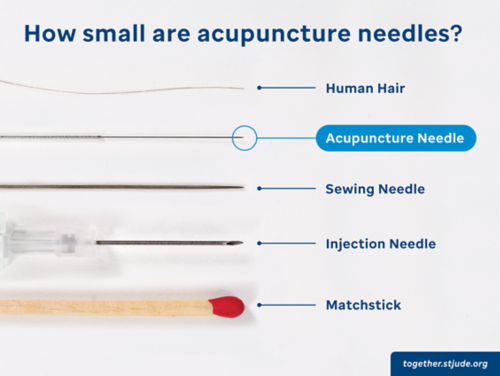What is acupuncture?
Acupuncture is the insertion of thin needles into the skin or muscle at specific points (acupoints) that lie along nerves. Acupuncture helps to control the way the nerves and immune system work, which may relieve symptoms. You should select a well-trained professional (acupuncturists) who has a license to perform this procedure.
Acupuncturists (trained professionals who perform acupuncture) may use pressure, heat, or mild electrical currents as part of their treatments. These treatments may help relieve treatment side effects such as nausea, vomiting, pain, or fatigue. Licensed acupuncturists can safely perform acupuncture for children and teens with cancer or blood disorders.
What symptoms does acupuncture treat?
Acupuncture does not take the place of medical treatment or "cure" a disease.
Acupuncture has been used to treat:
What happens during acupuncture?
Acupuncture needles are very thin, just slightly thicker than a strand of human hair. These needles are solid and less painful than the hollow needles doctors use for injections. They are sterile (free from germs) and disposed of after use.
The acupuncturist will ask about your child’s symptoms, examine your child’s skin, tongue, eyes, and pulse (heart rate), and other body areas depending on symptoms. The acupuncturist will then perform the procedure, which includes the following steps:
- Your child will lie down on a padded table.
- The acupuncturist will clean the skin to remove germs.
- The practitioner will insert the needles into the skin or muscles where needed, one needle at a time.
- Treating one part of the body that is not in pain can help relieve symptoms in another area
- Some children might feel a slight prick, tingle, or ache, but many patients do not feel the needle entering at all. Usually, there is no pain after the needle is in place.
- The acupuncturist may use mild electrical energy for stimulation, if needed.
- The needles stay in place for 5-15 minutes for young children, and 15-30 minutes for older children.
- The acupuncturist will remove the needles.
Acupuncture risks
Talk to your doctor before your child receives acupuncture. Let your doctors know if your child or teen has:
- Neutropenia
- Thrombocytopenia
- Previous chemotherapy that is expected to lower the blood counts
- Any infections
- Heart murmur
- Irregular heartbeat (arrythmia) or pacemaker
- An implanted medical device like a subcutaneous port (port-a-cath)
- Lymphedema (when lymphatic fluid from cells and tissue collects in the body)
- Pregnancy
- Bleeding or blood clotting problems
- Any other serious diseases (cancer, diabetes, HIV)
Acupuncture side effects
Some mild side effects can occur after acupuncture, and may include:
- Pain, usually at the site of the needle treatment
- Bruising
- Minor bleeding at the site of the needle prick
More severe side effects are very rare. These side effects could include:
- Infection
- Damage to a nerve
- Punctured organ
- Collapsed lung (pneumothorax)
- Fainting
- Dizziness
- Asthma attack
- High blood pressure
You should contact your doctor if your child has any severe side effects from acupuncture.
How to choose an acupuncturist?
You should talk with your care team before seeing an acupuncturist. They may recommend a licensed provider who has experience treating children and teens. Licensed providers will use sterile needles and the correct steps to prevent injury and infection.
You can ask questions about an acupuncturist’s training, certification, and their license. Ask if the provider has worked with children or teens with cancer.
There may be medical boards in your area that have information. License requirements vary with location. The American Board of Medical Acupuncture (ABMA) grants certification to physician acupuncturists in the United States. The American Academy of Medical Acupuncture (AAMA) provides a directory of physicians who practice medical acupuncture (see “For more information” section below)
Questions to ask your health care team
Here are some questions to ask your health care team about acupuncture:
- Could acupuncture help relieve my child’s symptoms?
- What will my child feel if they get acupuncture?
- What are the benefits and risks of acupuncture?
- Will acupuncture affect other treatments my child is getting?
- What side effects can my child expect?
Origin and development of acupuncture
Acupuncture is one part of traditional Chinese medicine. Practitioners of this treatment developed it over thousands of years to promote healing and wellness. Disease, injury, and pain can block the flow of energy and cause an imbalance in the body. Removing these blocks corrects the imbalance and helps the body heal.
If you have questions about acupuncture, call your health care provider.
—
Reviewed: November 2022

